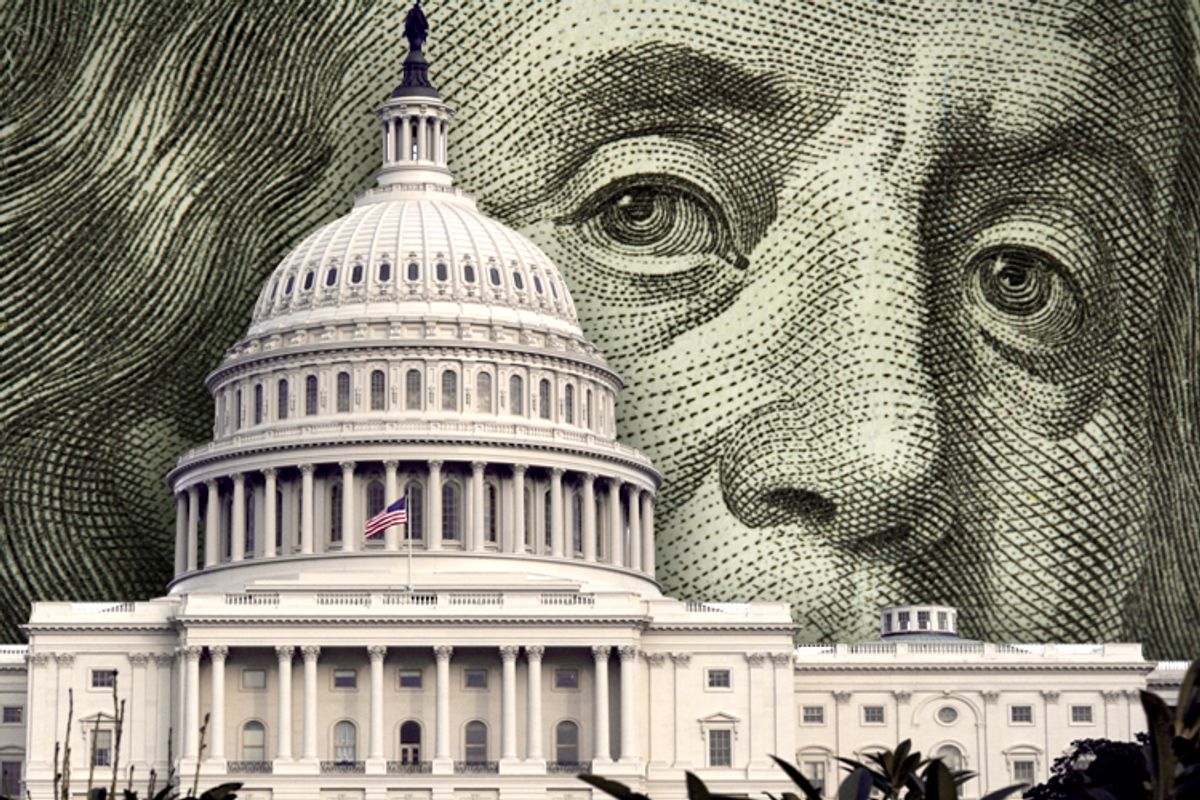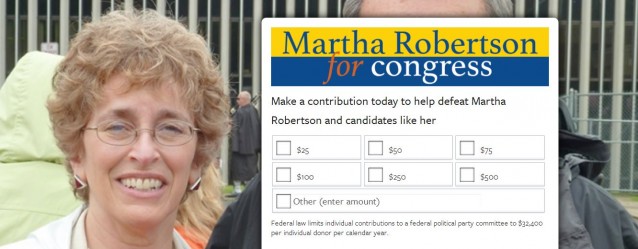As dirty tricks go, this one is pretty minor, and even a bit funny:
The National Republican Congressional Committee has set up a number of websites that look like they could be a Democratic candidate’s campaign page, unless you read the fine print. They may even violate a Federal Election Commission regulation, Campaign Legal Center expert Paul S. Ryan explained to ThinkProgress.
The websites have large photos of Democratic candidates (and the photographs, unlike those in your typical anti candidate ad, are smiley and mostly flattering), and big, official-looking "[name] for Congress" graphics. There is a bit of much smaller type, and then the usual donation boxes. Except! The small type explains that you are donating to defeat this person. Here's one of them:
The NRCC bought Google ads to send people searching for the candidates to the faux sites, which were all registered with official-sounding URLs like "domenic-recchia.com." Then they bragged about it to donors:
After the NRCC launched three such sites, including one targeting New York Democratic congressional candidate Sean Eldridge, Rep. Lynn Westmoreland, R-Georgia, deputy chairman of the NRCC, wrote in a September fundraising pitch to donors, "We ruined three Democrats' campaign launches last week and the Democratic Congressional Campaign Committee (Pelosi's campaign machine) couldn't be more upset."
As of now, there are at least six of these fake sites, all promoted with Google ads to make them appear at the very top of searches, with that barely legible yellow background (denoting paid links) that Google hopes you don't notice. At least one person accidentally donated to the RNC while intending to donate to a Democratic candidate. The NRCC agreed to refund his donation, but obviously people who never realize they were tricked won't ask for refunds. It may not be quite Nixonian, but yes, solid dirty trick, NRCC.
Of course, it's very probably illegal, as an election law expert told National Journal:
"This doesn't even strike me as a close call," said Paul S. Ryan, senior counsel for the Campaign Legal Center, a nonpartisan campaign watchdog group. "It's a slam dunk."
Another expert essentially concurred:
Larry Noble, a former general counsel of the FEC and now the head of a bipartisan Americans for Campaign Reform, said there is a "strong argument" that the NRCC sites are over the line.
"Part of their attempt is to sow confusion and draw people there who would be looking for the candidate's website," Noble said. The FEC rules exist, he said, to try to avoid such voter confusion. "All the candidate has is their name."
So these sites are very probably a violation of campaign law. At the very least, the Federal Election Commission ought to investigate. That, by the way, could take around two years. As Ryan told Think Progress, "the FEC is 'not a nimble organization,'" which means that it doesn't actually enforce the law effectively or within a reasonable amount of time. The next congressional elections, the ones these ads are about, will almost certainly be long done by the time the FEC concludes any possible investigation.
Not that you should actually expect the FEC to do anything even after the election! A Republican campaign lawyer, who believes the ads are legal, explained why to National Journal:
Legality aside, whether the elections commission, which is equally divided between three Republicans and three Democrats and even more gridlocked than Capitol Hill, would ever crack down on the microsites is another matter, Noble said.
"Would there be four votes at the FEC to do anything about it?" he asked. "I have some serious doubts."
If it seems to you that there's not really any compelling reason to abide by FEC regulations, considering that their enforcement of those regulations is usually delayed until well after any given violation could have already affected an election, and considering further that the bipartisan composition of the commission means that certain violations are extremely unlikely to be punished, then congratulations, you just realized what the NRCC apparently realized some time ago.
In the absence of the threat of enforcement, the only thing stopping a political party from outright ignoring campaign finance regulations is a sort of gentlemen's agreement not to. There was a similar situation in the Senate regarding the use of the filibuster, and we all remember how that turned out.
The remarkable thing about the arrest and indictment of Dinesh D'Souza for illegal campaign contributions is that anyone was arrested for illegal campaign contributions at all. It's very hard to find an illegal method of shoveling huge amounts of money toward your chosen causes. Still, it was in some sense worth it: D'Souza was arrested in 2014 after illegally sending more than $10,000 to a candidate who lost -- lost quite spectacularly -- in 2012. If he'd backed a winner, D'Souza would've been arrested well after his money had helped someone get elected. (Though if he'd backed a winner, he wouldn't be such a quintessential putz.)
Our election laws, overwritten by conservative courts and enforced by crippled agencies, no longer serve much useful purpose. It may not even be possible to write meaningful new ones that could survive in this political climate.




Shares